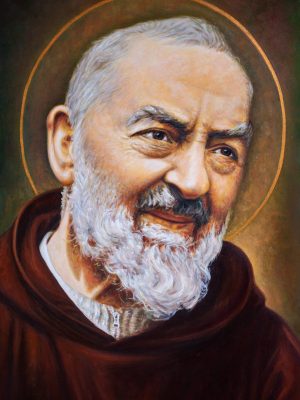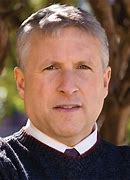The remarkable conversion of actor Shia LaBeouf is making waves among Catholics and the culture at large. I watched his testimony in a fascinating long interview with Bishop Robert Barron. LaBeouf comes across as fully sincere, repentant, and highly thoughtful. This is an obviously intelligent and informed individual, highly cerebral, who came to the Church on his knees through a Dark Night of the Soul.
“I had a gun on the table,” LaBeouf admitted to Barron. “I was outta here. I didn’t want to be alive anymore…. Shame like I had never experienced before — the kind of shame that you forget how to breathe. You don’t know where to go.”
Where LaBeouf went was a Franciscan Capuchin monastery. What brought him there was an offer to play Padre Pio in an upcoming film on the life of the incredible friar from San Giovanni Rotondo, Italy, who died in September 1968 after 50 years of suffering the bleeding wounds of Christ in his hands, feet, and side. Pio’s stigmata are not disputed. He was a modern figure, and his wounds were examined repeatedly by the most stubborn skeptics, from secularists to psychiatrists to physicians to doubters in his own Church among high-ranking clergy. All became believers; they couldn’t doubt their own eyes.
And neither could Shia LaBeouf, who saw the photos, the video, read the testimonies, and played the part. One young person familiar with Shia LaBeouf’s tormented lifestyle said to me, “Can you believe this guy converted? He was a trainwreck.” My response: “Read a good biography of Padre Pio.”
Anyone who sits down to study the life of Padre Pio will be converted. No modern human lived a life so miraculous and so documented. Study Padre Pio and you will become a believer.
Several years ago, I had an interesting Pio experience with, ironically, a Hollywood actor, about the same age as Shia LaBeouf. We were having lunch in a Beverly Hills restaurant when he showed me the Pio medal he was wearing. “He’s my confirmation saint,” the actor told me. “He played a major part in my conversion.”
Not everyone sitting at our table of six was Catholic or a Christian. They betrayed incredulous glances as the actor gushed about the account of Pio’s stigmata, miracles, bilocation, and favorite story of all: the alleged appearance of Padre Pio high in the sky during World War II to prevent a bombing. “The man was like a real-life superhero!” the actor marveled.
I could tell this was a bit much for others at the table, who suspected the actor’s enthusiasm had gone overboard. Thus I, as a historian, chimed in with something to the effect, “I know that sounds unbelievable, but I’ve read the account of Pio in the sky. The witnesses swear it was true.”
Two authoritative modern biographies that document the episode are C. Bernard Ruffin’s Padre Pio: The True Story (Ruffin, a Lutheran pastor, in 2018 released an updated third edition of the biography) and Renzo Allegri’s Padre Pio: Man of Hope.
Allegri is a respected Italian journalist. He interviewed people who interacted with Pio. In the case of Pio appearing in the sky, Allegri tracked down Dr. Bernardo Rosini, a general in the Air Force. Rosini testified:
“After the war, I was serving in Bari at the United Air Command, which was responsible for all the new units that were created after Italy’s defeat and that operated side by side with the Air Force. The General Command for the U.S. Air Force was also in Bari. I got to know several officers who told me that Padre Pio had saved them during one of their operations. Even the commanding general played a role in this incident, which was widely discussed. One day he himself wanted to pilot a squadron of bombers on a mission to destroy a German munitions dump that was located near San Giovanni Rotondo. The general said that when he and his pilots were in the vicinity of the target, they saw the figure of a monk with upraised hands appear in the sky. The bombs broke loose from the plane on their own, and fell in the woods, destroying the target without the pilots intervening. That evening this episode was the main topic of conversation among the pilots and their officers.”
You can bet it was. That is why the story became legendary. The witnesses couldn’t stop talking about it. Rosini continued:
“Everyone wanted to know who the monk was. Someone told the commanding general that there was a monk who worked miracles living in San Giovanni Rotondo. He decided to go to San Giovanni Rotondo as soon as the country was liberated to see if it was the same monk that he had seen in the sky. After the war the general, accompanied by some of the pilots, went to the Capuchin monastery there. As soon as they entered the sacristy, they saw several monks and immediately recognized Padre Pio as the one they had seen in their planes. Padre Pio introduced himself and, putting his hand on the general’s shoulder, said, ‘So, you’re the one who wanted to destroy everything.’ Overwhelmed by the monk’s look and his words, the general knelt down in front of him. Padre Pio had spoken, as usual, in his dialect, but the general was convinced that the monk had spoken to him in English. The two became friends. The general, who was Protestant, later converted to Catholicism” (Allegri, Padre Pio: Man of Hope, pp. 130-31).
That’s an account of a real-life superhero, making one of his many saves—and converts—during a truly amazing lifetime. With Shia LaBeouf, it looks the humble priest of Pietrelcina made another. And hopefully LaBeouf’s movie about the superhero priest will be good and save yet many more.








